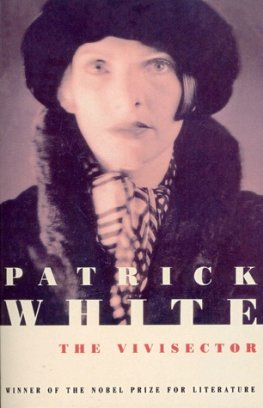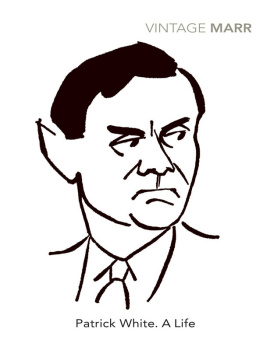FOR MARIE DESTOURNELLES DE CONSTANT
THERE is a man here, miss, asking for your uncle, said Rose.
And stood breathing.
What man? asked the young woman, who was engaged upon some embroidery of a difficult nature, at which she was now forced to look more closely, holding the little frame to the light. Or is it perhaps a gentleman?
I do not know, said the servant. It is a kind of foreign man.
Something had made this woman monotonous. Her big breasts moved dully as she spoke, or she would stand, and the weight of her silences impressed itself on strangers. If the more sensitive amongst those she served or addressed failed to look at Rose, it was because her manner seemed to accuse the conscience, or it could have been, more simply, that they were embarrassed by her harelip.
A foreigner? said her mistress, and her Sunday dress sighed. It can only be the German.
It was now the young womans duty to give some order. In the end she would perform that duty with authority and distinction, but she did always hesitate at first. She would seldom have come out of herself for choice, for she was happiest shut with her own thoughts, and such was the texture of her marble, few people ever guessed at these.
What will I do with this German gentleman? asked the harelip, which moved most fearfully.
The flawless girl did not notice, however. She had been brought up with care, and preferred, also, to avoid an expression of longing in her servants eyes. She frowned rather formally.
We cannot expect Uncle for at least another hour, she said. I doubt whether they have reached the sermon.
That strange, foreign men should come on a Sunday when she herself had ventured on a headache was quite exasperating.
I can put the gentleman in your uncles study room. No one ever goes in there, said the servant. Except, there is no knowing, he could lay his hands on something.
The squat womans flat face suggested it had experienced, and understood, all manner of dishonesty, but was in the habit of contemplating such behaviour from a dull distance since she had become the slave of virtue.
No, Rose, said the girl, her mistress, so firmly at last that the toe of her shoe thumped against her petticoats, set them sawing at one another, and the stiff skirt, of a deep, lustrous blue, added several syllables to her decision. There is no avoiding it, I can see. It would not be civil. You will show the gentleman in here.
If it is right, her thoughtful servant dared to suggest.
The young woman, who was most conscientious in her needlework, noticed how she had overstitched. Oh, dear.
And, Rose, she added, by now completely her own mistress, after we have talked for a little, neither too long, nor too short, but decently, you will bring in the port wine, and some of my aunts biscuits that she made yesterday, which are on the top shelf. Not the best port, but the second best. It is said to be quite nice. But make sure, Rose, that you do not wait too long, or the refreshment will arrive with my uncle and aunt, and it would be too confusing to have so much happen at once.
Yes, miss, said Rose, whose business it was not. Will you be taking a glass yourself?
You may bring one, said the young woman. I shall try a biscuit, but whether I shall join him in the wine I cannot yet say.
The servants skirts were already in motion. She wore a dress of brown stuff, that was most marvellously suited to her squat body.
Oh, and Rose, called the young woman, do not forget to announce Mr Voss on showing him into the room.
Mr Voss? That is the gentlemans name?
If it is the German, replied the girl, who was left to consider her embroidery frame.
The room in which she sat was rather large, darkened by the furniture, of which the masses of mellow wood tended to daunt intruding light, although here and there, the surface of a striped mirror, or beaded stool, or some object in cut glass bred triumphantly with the lustier of those beams which entered through the half-closed shutters. It was one of the first sultry days of spring, and the young woman was dabbing at her upper lip with a handkerchief as she waited. Her dress, of that very deep blue, was almost swallowed up, all but a smoulder, and where the neat cuffs divided it from her wrists, and at the collar, which gave freedom to her handsome throat. Her face, it had been said, was long-shaped. Whether she was beautiful it was not at first possible to tell, although she should, and could have been.
The young woman, whose name was Laura Trevelyan, began to feel very hot as she listened for sounds of approach. She did not appear to listen, however, just as she did not appear nervous; she never did.
The keenest torment or exhilaration was, in fact, the most private. Like her recent decision that she could not remain a convinced believer in that God in whose benevolence and power she had received most earnest instruction from a succession of governesses and her good aunt. How her defection had come about was problematic, unless it was by some obscure action of antennae, for she spoke to nobody who was not ignorant, and innocent, and kind. Yet, here she was become what, she suspected, might be called a rationalist. If she had been less proud, she might have been more afraid. Certainly she had not slept for several nights before accepting that decision which had been in the making, she realized, several years. Already as a little girl she had been softly sceptical, perhaps out of boredom; she was suffocated by the fuzz of faith. She did believe, however, most palpably, in wood, with the reflections in it, and in clear daylight, and in water. She would work fanatically at some mathematical problem, even now, just for the excitement of it, to solve and know. She had read a great deal out of such books as had come her way in that remote colony, until her mind seemed to be complete. There was in consequence no necessity to duplicate her own image, unless in glass, as now, in the blurry mirror of the big, darkish room. Yet, in spite of this admirable self-sufficiency, she might have elected to share her experience with some similar mind, if such a mind had offered. But there was no evidence of intellectual kinship in any of her small circle of acquaintance, certainly not in her own family, neither in her uncle, a merchant of great material kindness, but above all a man, nor her Aunt Emmy, who had upholstered all hardnesses till she could sit on them in comfort, nor her Cousin Belle, with whom she did share some secrets, but of a hilarious nature, for Belle was still young. So really there was nobody, and in the absence of a rescue party she had to be strong.
Absorbed in the depths of the mirror and her own predicament, Laura Trevelyan forgot for these few flashing instants her uncles caller, and was at once embarrassed when Rose Portion, the emancipist servant, stood inside the room, and said:
Mr Voss, miss.
And closed the door.
Sometimes, stranded with strangers, the composed young womans lovely throat would contract. Overcome by breathlessness, she would suspect her own words of preparing to lurch out and surprise, if not actually alarm. Then they would not. To strangers she was equable, sometimes even awful.
You must excuse my uncle, Laura Trevelyan said. He is still at Church.
Her full skirt was moving across the carpet, sounding with petticoats, and she gave her cool hand, which he had to take, but did so hotly, rather roughly.
I will come later. In perhaps one hour, said the thick voice of the thin man, who was distressed by the furniture.
It will not be so long, answered the young woman, and I know my aunt would expect me to make you comfortable during that short time.
She was the expert mistress of trivialities.















